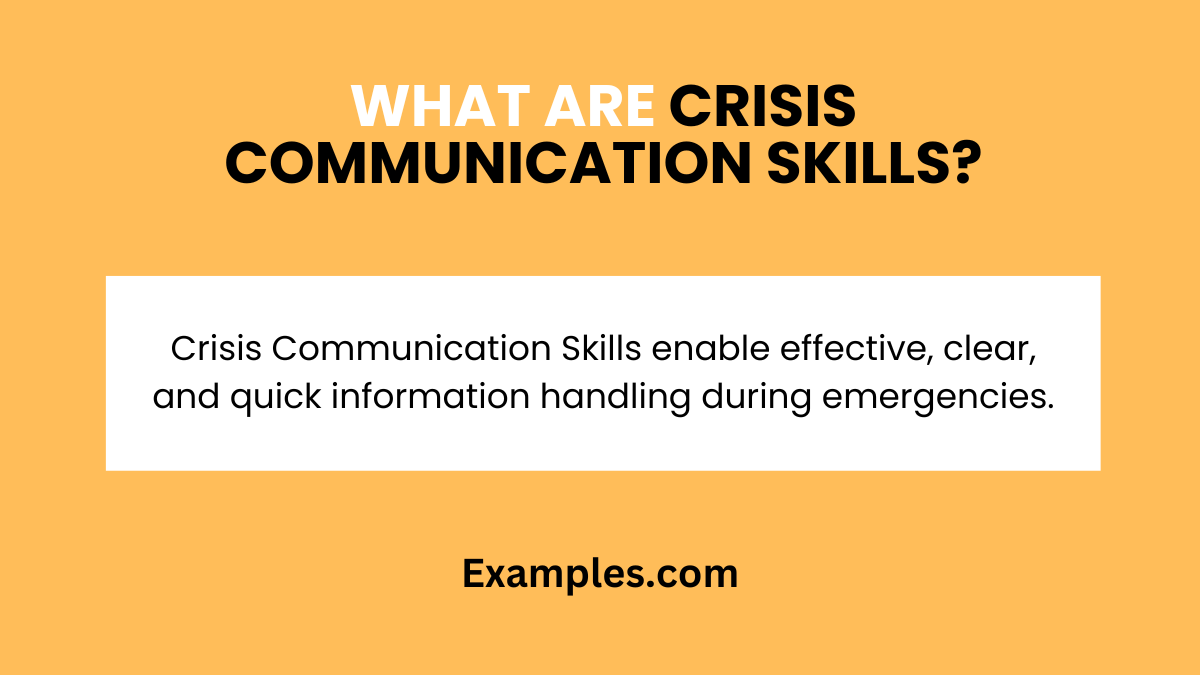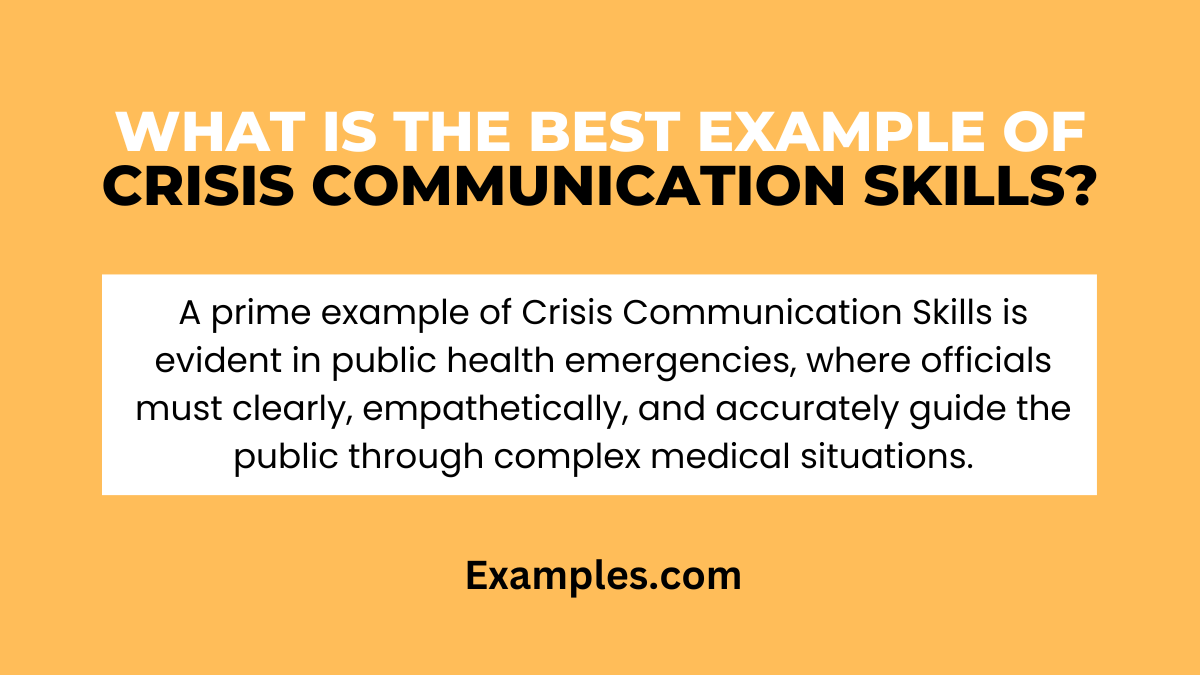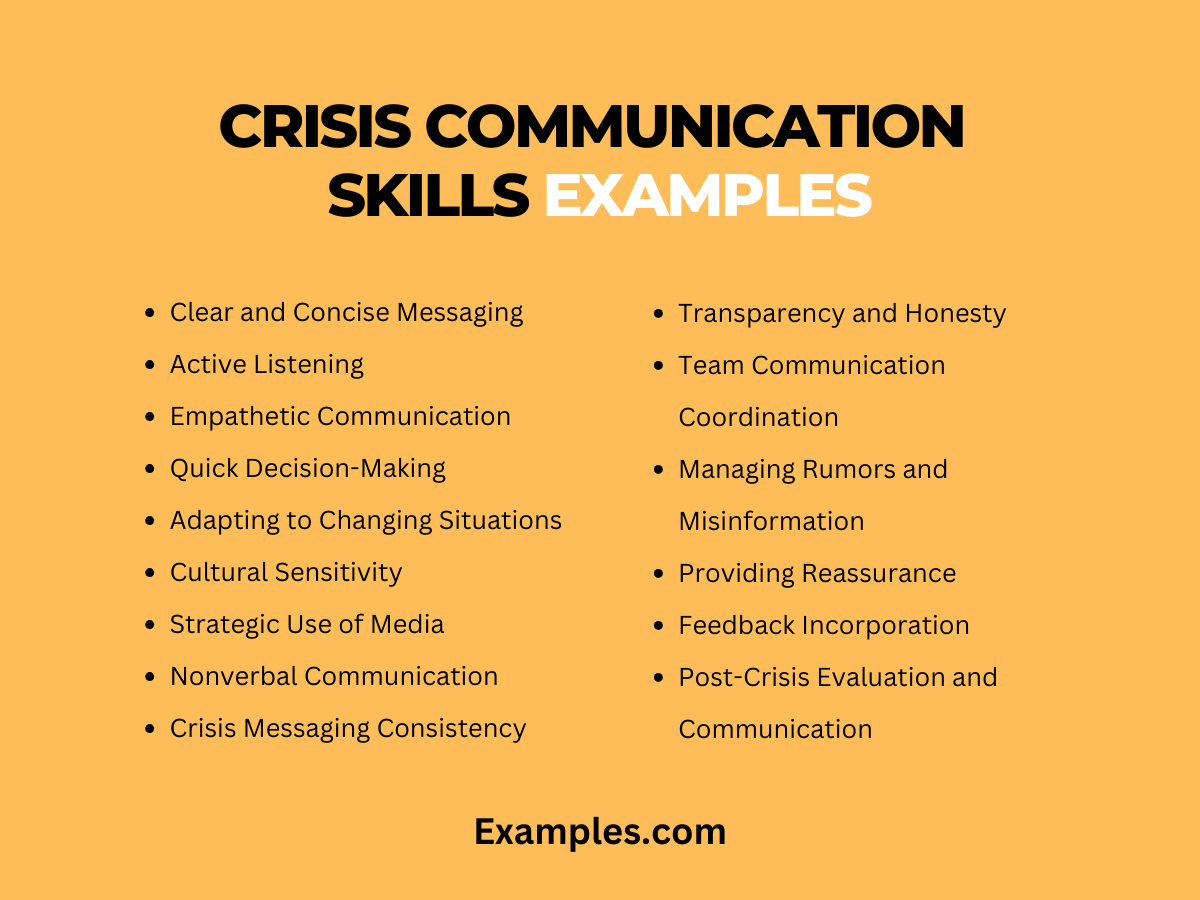14+ Crisis Communication Skills Examples
In the intricate landscape of crisis management, possessing robust Crisis Communication Skills is indispensable. This guide delves into the core competencies required to effectively navigate and manage crises. From handling high-pressure situations with assertive communication to engaging in empathetic listening, these skills are crucial for maintaining calm and order. We’ll explore various real-life scenarios where these skills become pivotal, offering a comprehensive understanding of how to communicate effectively, manage stakeholder expectations, and lead decisively during critical moments.
What are Crisis Communication Skills?

Crisis Communication Skills encompass a set of abilities essential for effectively managing and communicating during crisis situations. These skills include the ability to convey information clearly and concisely, remain calm under pressure, make quick decisions, and show empathy towards those affected. Effective crisis communication also involves adapting messages for different audiences, maintaining transparency, and managing the flow of information to prevent miscommunication. These skills are crucial for anyone responsible for handling emergencies, be it in corporate, public, or personal spheres.
What is the Best Example of Crisis Communication Skills?

A quintessential example of Crisis Communication Skills can be seen in the handling of emergency situations by first responders. In such high-stakes environments, clear and direct communication is vital. First responders must swiftly assess situations, convey critical information to affected individuals, coordinate with teams, and provide instructions to ensure safety. Their ability to remain composed, deliver clear instructions amidst chaos, and reassure those in distress demonstrates exceptional crisis communication. This example underscores the importance of clarity, calmness, and command in crisis scenarios.
15 Crisis Communication Skills Examples

Crisis Communication Skills are essential in managing and mitigating the impact of crises effectively. This guide explores 15 key skills, each crucial in navigating different aspects of crisis management. From assertive communication to empathetic listening, these skills encompass various techniques that ensure clear, accurate, and timely information dissemination. They play a pivotal role in maintaining public trust, handling miscommunication, and leading teams through challenging situations. Mastering these skills is vital for anyone involved in crisis response, providing the tools needed to handle emergencies with competence and confidence.
- Clear and Concise Messaging
- Conveying information in a straightforward and understandable manner.
- Example: “For your safety, evacuate the area immediately and follow the marked routes.”
- Active Listening
- Fully concentrating and understanding stakeholders’ concerns during a crisis.
- Example: “I understand your concerns. Let’s address them one by one.”
- Empathetic Communication
- Showing empathy and understanding towards those affected by the crisis.
- Example: “We recognize the difficulties you’re facing and are here to support you.”
- Quick Decision-Making
- Making prompt decisions to provide timely responses in crisis situations.
- Example: “Given the urgency, we are implementing immediate safety measures.”
- Adapting to Changing Situations
- Flexibility in modifying communication strategies as the situation evolves.
- Example: “As the situation develops, here are the updated guidelines…”
- Cultural Sensitivity
- Communicating effectively across diverse cultures, especially in global crises.
- Example: “We respect all cultural perspectives and are addressing the crisis accordingly.”
- Strategic Use of Media
- Utilizing various media channels effectively to disseminate information.
- Example: “Please follow our official social media channels for real-time updates.”
- Nonverbal Communication
- Using body language and tone to convey the right message and tone.
- Example: “[Through calm demeanor] We are fully in control and taking all necessary steps.”
- Crisis Messaging Consistency
- Ensuring consistent messaging across all communication platforms.
- Example: “Our message remains the same across all updates for clarity.”
- Transparency and Honesty
- Being open and honest in all communications during a crisis.
- Example: “We believe in transparency and will share all the information we have.”
- Team Communication Coordination
- Coordinating effectively with the team to ensure a unified response.
- Example: “Team, let’s stay aligned and communicate consistently with our stakeholders.”
- Managing Rumors and Misinformation
- Addressing and correcting misinformation quickly and effectively.
- Example: “Contrary to rumors, here are the verified facts…”
- Providing Reassurance
- Offering reassurance to affected parties and stakeholders.
- Example: “We are working tirelessly to resolve this situation and ensure your safety.”
- Feedback Incorporation
- Incorporating feedback to improve ongoing crisis communication efforts.
- Example: “Your feedback is valuable, and we’re adjusting our approach based on it.”
- Post-Crisis Evaluation and Communication
- Reflecting on and communicating about the crisis after it has been resolved.
- Example: “Now that the crisis is over, here’s our evaluation and the lessons we’ve learned.”
What are Essential Skills for Crisis Communications?
In the realm of crisis communications, certain essential skills stand out for their effectiveness in managing challenging situations:
- Clarity and Conciseness: The ability to convey information clearly and succinctly is vital to prevent misunderstandings and ensure message retention during a crisis.
- Rapid Response and Adaptability: Quick thinking and adaptability are crucial for responding effectively to evolving situations and mitigating potential damage.
- Emotional Intelligence and Empathy: Understanding and addressing the emotional needs of stakeholders can help in managing panic and maintaining trust.
- Strategic Planning and Preparedness: Proactively developing crisis communication plans and being prepared for various scenarios are key to swift and effective crisis management.
- Media and Public Relations Savvy: Navigating media relations with skill, including press releases and social media communication, is crucial for controlling the narrative and minimizing reputational damage.
What are Crisis Communication Skills in Public Relations?
In public relations, crisis communication skills are tailored to manage the organization’s public image:
- Message Control and Brand Management: Crafting messages that protect and reinforce the brand’s image during crises.
- Stakeholder Engagement: Effectively engaging with stakeholders, including media, customers, and employees, to maintain relationships and trust.
- Reputation Recovery and Damage Control: Implementing strategies to rebuild reputation post-crisis and control any negative impact.
- Transparent and Honest Communication: Upholding transparency and honesty to maintain public trust and credibility.
- Media Training and Spokesperson Skills: Having well-trained spokespersons who can effectively communicate with the media and the public during crises.
Why are Crisis Communication Skills Important in Today’s Business Landscape?
Crisis communication skills are increasingly vital in today’s business landscape due to several factors:
- Rapid Information Spread: With digital platforms, information spreads quickly, making swift and accurate communication essential to control narratives.
- Increased Public Scrutiny: Businesses face heightened scrutiny from the public and media, requiring skilled communication to manage perceptions.
- Global Market Vulnerability: Global businesses face diverse crises, making adaptable and culturally sensitive communication critical.
- Brand Reputation and Trust: Effective crisis communication is key to maintaining or rebuilding brand reputation and customer trust.
- Legal and Compliance Implications: Proper communication can mitigate legal risks and ensure compliance with regulatory requirements during crises.
In conclusion, mastering Crisis Communication Skills is essential in today’s rapidly evolving business and public landscape. This guide has explored various crucial skills, offering insights and practical examples for effective crisis management. Embracing these skills not only prepares individuals and organizations for potential crises but also equips them with the tools to handle challenging situations with confidence, maintaining trust, and safeguarding reputation in any crisis.



